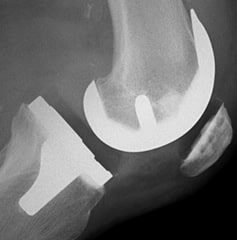
Knee replacement surgery is performed for people with severe pain and poor quality of life due to arthritis. As the baby boomer generation ages the number of knee replacements performed every year continues to rise. The decision to undergo a knee replacement is a big one. There are many risks associated with a knee replacement. The need for blood transfusion after knee replacement surgery is associated with many potential complications.
The most feared complication of a knee replacement is an infection. The causes of infections are multi-factorial. That means there are many reasons why an infection might occur. One of the more easily controlled risks for infection is whether or not you receive a blood transfusion after your knee replacement surgery. Fortunately, there are now methods in place which dramatically diminishthe need for blood transfusions after a knee replacement.
Blood transfusions in the realm of knee replacement surgery are associated with many risks and many issues. Among them are:
- A longer stay in the hospital
- More leg swelling
- A higher infection rate
- A higher overall complication rate
- Lower satisfaction with your end result.
Transfusion Risks in Knee Replacement
Because of all these issues it is important to minimize the risk of requiring a blood transfusion as much as possible. When you have your blood tests performed your hemoglobin level will be checked. Hemoglobin carries the oxygen in your blood. Hemoglobin is found within your red blood cells. If your hemoglobin level is low, you may require testing before surgery and possible treatment for the reason why your hemoglobin is low. The lower your hemoglobin before the surgery, the higher the risk that you will receive a blood transfusion after the surgery.
During surgery we make many small cuts in the bone so that we can place the knee replacement on the end of the bone. All those cut edges bleed. They ooze blood during and after the surgery. There are also many small blood vessels around the knee which are cut during the procedure and each has the chance of adding to your overall blood loss during surgery which could increase your risk of transfusion. For many years now, many of us have been using Tranexamic Acid (TXA) to help control and stop that oozing during and after surgery.
Tranexamic Acid and Decreasing Transfusion Risk in Knee Replacement Surgery
Our European counterparts started using using TXA well over a decade ago with very favorable results. Those results didn’t make it into the US based literature so TXA use did not come on the scene here until much more recently. A recent study in the Journal of Bone and Joint Surgery reveals that the risk of needing a blood transfusion is decreased dramatically when TXA is utilized during surgery. TXA prevents clots from being dissolved by our body. Many surgeons were afraid that it might cause issues with clotting in our veins and heart so that might explain why the adoption of TXA use in the US has been surprisingly slow. TXA is also very inexpensive so Big Pharma is not pushing its use either.
Risks of Tranexamic Acid in Knee Replacement Surgery
Many studies have now been published showing that there is likely no increase in complications associated with TXA use. There has been no increase in blood clots or heart related complications. The most recent study out of Michigan actually showed an association with a decrease risk of blood clots (DVT) after knee replacement surgery when TXA was given to patients.
Do you have questions regarding an Orthopedic injury or longevity?
Do you want to talk to an expert who can listen to you for 45-60 minutes and explain the options in detail?
Dr. Howard Luks offers remote guidance sessions to review your X-ray or MRI images and explain your options.
Dr. Luks has also received hundreds of requests for educational sessions on the topics discussed in his book, Longevity Simplified.
Many of us have safely used TXA for years during knee replacement surgery and have dramatically reduced or nearly eliminated the risks of you needing a blood transfusion. Be sure to talk to your surgeon about their strategies to minimize the risk of you needing a blood transfusion after knee replacement surgery.













Joy Bausch
I just had a knee replacement and had to have a blood transfusion after. Is it. Normal to be tired all the time after this
The surgery alone can make you feel that way. Your blood count might still be a bit low too. You can have your primary care doctor run some tests and examine you if you are concerned.
Karen
I just got back from seeing my brother, 51, after a total knee replacement. As I left the hospital after 2 hours, (his surgery was 6 days ago), he rang me and said, he had just been informed that he has to have 2 units of blood. He was anaemic, and had informed me that for the last 3 days, had had his Opsite dressing renewed 4 times due to the blood under the dressing pooling…??? (slightly worrying). Also, his BP was 97/54 that morning!!! – When I got there this afternoon, his BP had stabilised and this was obviously something I found out afterwards. I’m seriously concerned